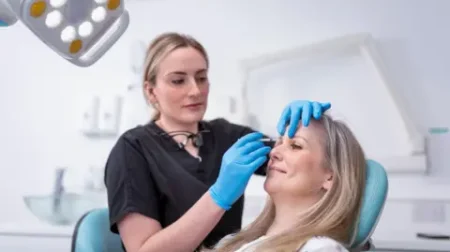The ongoing tribunal concerning a dispute between a transgender doctor and a nurse has revealed emotionally charged accounts of distress and confrontation within the NHS Fife system. The case centers on Dr. Beth Upton, a transgender physician, who became visibly upset following a disagreement with nurse Sandie Peggie regarding the access to female changing rooms at Victoria Hospital in Kirkcaldy. According to reports, Dr. Upton sobbed when she recounted her experience to her colleague, Dr. Elspeth Pitt, further underlining the emotional stakes involved in issues of gender identity and workplace respect in healthcare settings.
The conflict unfolded on Christmas Eve of 2023, following a disagreement in which Ms. Peggie expressed that Dr. Upton should not utilize the same changing room as other female staff. This incident prompted Dr. Upton to raise a formal complaint against Ms. Peggie, which subsequently led to the nurse’s suspension on January 3, 2024. Throughout the tribunal hearing, evidence was presented that illustrated the evolving dynamics within the NHS, particularly in the wake of increasing awareness and sensitivity surrounding transgender rights.
Dr. Pitt shared her recollection of the aftermath of the confrontation, stating that Dr. Upton appeared “pale” and “very shaken” when they met after their shifts. Notably, she described Dr. Upton’s emotional state as “distressed” and “fearful.” This description starkly contrasted with what might be expected in a professional healthcare environment, highlighting the personal and systemic challenges that can arise when gender identity intersects with institutional policies.
During her testimony, Dr. Pitt indicated that Dr. Upton “felt cornered” during the interaction with Ms. Peggie, which amplified her emotional turmoil. The consultant, who has a significant role within NHS Fife, was sensitive to the nuances of the situation and felt it crucial to support her colleague, informing Dr. Upton of avenues available for her to seek help, such as connecting with a peer support network through the British Medical Association.
The tribunal extended beyond just individual testimonies; it showcased a broader dialogue regarding gender identity within the medical profession. Witnesses provided insight into earlier meetings among senior consultants and nurses, which indicated a prior awareness of concerns surrounding Dr. Upton’s access to female spaces. These discussions reflect an ongoing shift in perceptions regarding gender identity in the workplace, marking a crucial evolution in workplace culture and regulations.
A points of contention that emerged during the tribunal proceedings involved an email sent by Dr. Kate Searle, Dr. Upton’s line manager. This email expressed solidarity with Dr. Upton while also condemning the actions of Ms. Peggie. The implications of such statements and how they are received within the staff hierarchy reveal the complexity of sentiments people hold surrounding gender issues.
This case serves as a pivotal opportunity for reflection within the NHS about the policies governing gender identity and inclusivity, especially in environments like healthcare where teamwork and mutual respect are paramount. As the tribunal continues, it has certainly opened a Pandora’s box of discussions about workplace rights, the culture of support for transgender individuals, and the need for clear guidelines to foster a secure environment for everyone.
In the broader context, this tribunal resonates with ongoing discussions in society at large about the rights of transgender people and women’s rights, raising critical questions about how we define boundaries, respect privacy, and promote equity in spaces traditionally marked by strict definitions of gender. The outcome of the tribunal could potentially influence policy changes within the NHS and serve as a precedent for similar disputes in the future, making it an essential case to watch.











